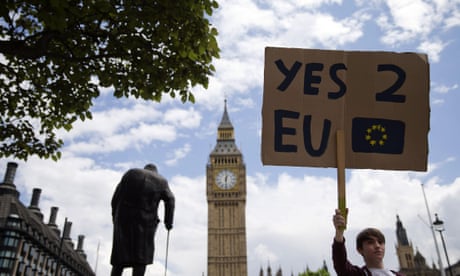It’s not over yet. A law that passed last year to set up the EU referendum said nothing about the result being binding or having any legal force. “Sovereignty” – a much misunderstood word in the campaign – resides in Britain with the “Queen in parliament”, that is with MPs alone who can make or break laws and peers who can block them. Before Brexit can be triggered, parliament must repeal the 1972 European Communities Act by which it voted to take us into the European Union – and MPs have every right, and indeed a duty if they think it best for Britain, to vote to stay.
It is being said that the government can trigger Brexit under article 50 of the Lisbon treaty, merely by sending a note to Brussels. This is wrong. Article 50 says: “Any member state may decide to withdraw from the Union in accordance with its own constitutional requirements.” The UK’s most fundamental constitutional requirement is that there must first be the approval of its parliament.
Britain, absurdly, is the only significant country (other than Saudi Arabia) without a written constitution. We have what are termed “constitutional conventions”, along with a lot of history and traditions. Nothing in these precedents allots any place to the results of referendums or requires our sovereign parliament to take a blind bit of notice of them.
It was parliament that voted to enter the European Economic Community in 1972, and only three years later was a referendum held to settle the split in Harold Wilson’s Labour party over the value of membership. Had a narrow majority of the public voted out in 1975, Wilson would still have had to persuade parliament to vote accordingly – and it is far from certain that he would have succeeded.

Petition for second EU referendum may have been manipulated
Our democracy does not allow, much less require, decision-making by referendum. That role belongs to the representatives of the people and not to the people themselves. Democracy has never meant the tyranny of the simple majority, much less the tyranny of the mob (otherwise, we might still have capital punishment). Democracy entails an elected government, subject to certain checks and balances such as the common law and the courts, and an executive ultimately responsible to parliament, whose members are entitled to vote according to conscience and common sense.
Many countries, including Commonwealth nations – vouchsafed their constitutions by the UK – have provisions for change by referendums. But these provisions are carefully circumscribed and do not usually allow change by simple majority.
In Australia, for example, a referendum proposal must pass in each of the six states (this would defeat Brexit, which failed in Scotland and Northern Ireland). In other countries, it must pass by a very clear majority – usually two-thirds. In some US states that permit voting on public legislative proposals, there are similar safeguards. In the UK (except, under a 2011 act in the case of an EU expansion of power), referendum results are merely advisory – in this case, advising MPs that the country is split almost down the middle on the wisdom of EU membership.
So how should MPs vote come November, when Prime Minister Boris Johnson introduces the 2016 European Communities Act (Repeal) Bill? Those from London and Scotland should happily vote against it, following their constituents’ wishes. So should Labour MPs – it’s their party policy after all.
By November, there may be other very good reasons for MPs to refuse to leave Europe. Brexit may turn out to be just too difficult. Staying in the EU may be the only way to stop Scotland from splitting, or to rescue the pound. A poll on Sunday tells us that a million leave voters are already regretting their choice: a significant public change of mind would amply justify a parliamentary refusal to Brexit. It may be, in November, that President Donald Trump becomes the leader of the free world – in which case a strong EU would become more necessary than ever. Or it may simply be that a majority of MPs, mindful of their constitutional duty to do what is best for Britain, conscientiously decide that it is best to remain.
There is no point in holding another referendum (as several million online petitioners are urging). Referendums are alien to our traditions, they are inappropriate for complex decision-making, and without careful incorporation in a written constitution, the public expectation aroused by the result can damage our democracy. The only way forward now depends on the courage, intelligence and conscience of your local MP. So have your say in the traditional way: lobby him or her to vote against the government when it tries to Brexit, because parliament is sovereign.
No comments:
Post a Comment